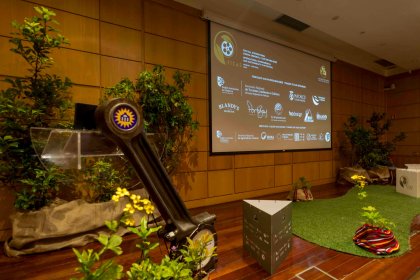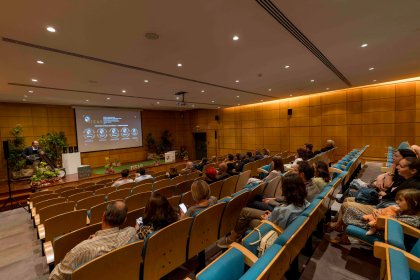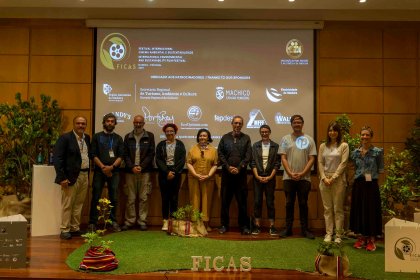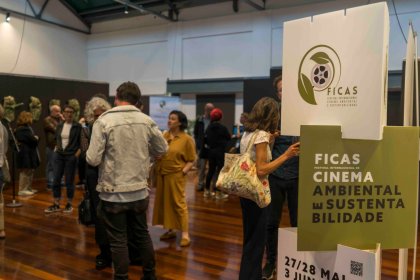Standard Fee
5€

Submissions deadline
31 Mar 26
0.4€
To screen and award best sustainable short films by filmmakers that promote debate on the preservation of regional, national and international forests or other relevant themes: climate change, biodiversity, conservation, renewable energy, sustainable agriculture, among others.
Films that promote environmental awareness and inspire positive change.
Films shown on the Internet or at other festivals are eligible.
Films can be in Portuguese or any other language with Portuguese subtitles. The organization may use fragments of the selected works (maximum 10%) to promote them and the festival.
The official selection will be announced to all applicants by May 2024, and will then be published on the festival's website and other communication channels.
Subtitling:
Submitted films that are not in Portuguese must be accompanied by a screener subtitled in Portuguese.
Subtitles are not required for the selection process, but if the film is selected we will ask for Portuguese subtitles for the screening.
The FICAS 2024 films will be screened in Funchal, Madeira Island.
Duration:
Short films: maximum duration of 25 minutes.
Feature films: minimum duration of 30 minutes.
Format:
Films shot in any format may participate. Screenings will be in 1080P digital file format (the type of file required for screenings will be communicated to those selected in advance).
Production date after 2019.
The organization reserves the right not to accept a film into the competition if it is not sent in by the deadline along with all the requested documentation.
Once the films have been received by the deadline, the organization will select those that will enter the competition.
Registration implies acceptance of these guidelines.
FICAS will only notify the selected films.
The festival does not pay any fees for screening films.
The Festival reserves the right to make any necessary changes to the regulations or program. Any issues not covered here will be resolved by the FICAS 2024 organization.
It is important that the film does not infringe the intellectual and/or industrial property rights of third parties. The organization assumes no responsibility for disputes that may arise between entities claiming the rights of authorship of a short or feature film.
Special rules of the Section:
Context:During the pre-production phase of sustainable cinema, the impacts on living beings, the biological cycles of ecosystems, geological elements and water resources that may be caused by filming activities in locations outside the natural environment with particular sensitivity should be assessed, and the consequent planning of preventive, corrective or mitigating actions for these impacts should be implemented during the filming phase.
Also the impacts on elements of the archaeological or historical-artistic heritage that may be caused by filming activities in historical locations.
Films will be selected that comply with at least 5 of the 10 rules selected by the organisation according to the following:
Prior point: the submission of works to the competition in the sustainable short film category must be accompanied by records of proof of compliance, such as: documents, licences, certificates, photocopies, etc.).
Rules:
1. Submission of a document with the guarantee measures adopted during outdoor filming, which allowed the filming locations/environment to be left in the same condition as they were found.
2. Use of reusable or ultimately recyclable materials in the construction of sets, props and costumes, guaranteeing that the environmental impacts caused by these materials have been minimised throughout their life cycle.
3. Statement of commitment that measures have been taken to minimise the consumption of toxic and/or hazardous substances due to their ecotoxicity (portable sanitary disinfectants, VOCs in paints for decoration and scenery, products used for special effects, CFC-free hairdressing products, etc.) including the correct dosage of these substances and their correct storage and handling.
4. Declaration of commitment and other evidence attesting to responsible consumption of office materials and consumables, especially in the pre-production phase, such as printing restricted to necessary documents and use of environmentally friendly office materials, especially with regard to paper consumption. If possible, include evidence of the use of PEFC or FSC recycled papers, lightweight papers and inks with a low environmental impact.
5. Declaration of commitment or other evidence of how selective collection, recycling of waste (toners, batteries, cartridges, paper, etc.) and subsequent management with authorised hauliers and managers has been ensured.
6. Declaration of commitment or other evidence that water-saving systems have been used to reuse the water used on the film set.
7. Statement and evidence of the application of sustainability criteria in the catering services for filming, based on the use of local products, seasonal and/or low water footprint foods, the distribution of food and drink in bulk (thus minimising waste generation), the use of reusable or compostable materials, crockery, catering waste management and the preference for catering companies close to the filming sets and, where possible, of a social nature.
8. Evidence that accommodation and catering services with sustainability and social responsibility policies or criteria have been selected.
9. Presentation of the Ecological Footprint Calculation of the Production, which considers, for example, the promotion of sustainable mobility for professionals, film crews and all the logistics associated with film production, using collective means of transport and minimising individual journeys, planning routes to minimise CO2 emissions and using ecological and eco-efficient vehicles.
10. Statement or evidence (if you haven't submitted documents for rule 9) of how energy consumption on set has been optimised, for example through the use of energy-saving technology for lighting (LED or low-consumption, automatic control and switch-off devices, promotion of natural light) and control of air-conditioning conditions on film sets.
Notes:
The application may also present evidence or references on the following items:
- Promoting employment among the local population (hiring extras, others).
Hiring local support service providers (catering, generator sets, cleaning services, etc.).
- Promoting the tourist and natural values of the filming locations whenever possible (on credit cards, in actions to promote the film production, etc.).
- Generating a sustainable legacy from filming. For example, if infrastructures and buildings have been built for filming that could be of some use to people, with a positive return for the local population.






